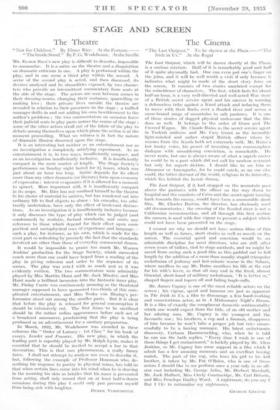The Cinema •
" The Last Outpost." To be shown at the Plaza.—" The Irish in Us. ' At the Regal The Last Outpost, which will be shown shortly at the Plaza, is a curious mixture. Half of it' is remarkably good and half of it quite abysmally bad. One can even put one's finger on the joins, and ft will be well worth a visit if only because it indicates what might be made of the short story form on the screen. It consists of two stories unrelated except for the coincidence of characters. The first, which lasts for about half-an-hour, is a very well-directed and well-acted War story of a British secret service agent and his success in warning a defenceless tribe against a Kurd attack and inducing them to move with their flocks over a flooded river and across a snow-bound range of mountains to safe pastures. It is one of those stories of dogged physical endeavour that the film does so well. belongs to the order, of Grass and The Covered Wagon. Mr. Claude Rains as the secret service agent in Turkish uniform and Mr. Cary Grant as the incurably light-minded and . rather stupid British officer whom he rescues from the Kurds both act extremely well. Mr. Rains's low husky voice, his power of investing even commonplace dialogue with smouldering conviction, is remarkable. . He never rants, but one is always aware of what a superb ranter he could be in a part which did not call for modern restraint but only for superb diction. I should like to see him as Almanzor or Aurengzebe, for he could catch, as no one else could, the bitter distrust of the world, religious in its intensity, which lies behind the heroic drama. • The Last Outpost, if it had stopped on the mountain pass above the pastures with the officer on the way down to hospital and the comforts of Cairo and the secret agent turning back towards the enemy, would have been 'a memorable short. film. Mr. Charles Barton, the director, has obviously used old documentaries : the crossing of the flooded river is not a Californian reconstruction, and all through this first section the camera is used with fine vigour to present a subject which could not have been presented on the stage.
I cannot see why we should not have serious flints of this length as well as farces, short stories as well as novels on the screen. The essential speed and concision would be an admirable discipline for most directors, who are still, after seven years of talkies, tied to stage methods, and we might be saved from seeing such a good film as this padded out to full length by the addition of a more than usually'stupid triangular melodrama of jealousy and last-Minute 'rescue in, the Sahara where needless to say Mr. Rains sacrifices his life at the end for his wife's lover, so that all may end in the fixed,' almost Oriental, short-hand of military melodrama; " It is better so,". clasped fingers and tepees off and fading bugle-calls.
Mr. James Cagney is one of the most reliable. actors on the, screen ; his vigour, speed and humour are just as apparent in The Irish in .11s, a film to discourage, a, less hard-working and conscientious actor, as in 4 Midsummer Night's Vivant. It is a film of exactly the complacent domestic sentimentality. which one would expect from the title, of an old, mother and her adoring sons. Mr. Cagney is the youngest .and the favourite son ;• his brothers, a cop and a fireman, disapprove of him because he won't, take, a, proper job but tries unsuc- cessfully to be a boxing manager. His, latest unfortunate discovery, Carbarn Hammersehlog, who, when he is told he can use the bath replies, " Every time I wash, in one of them things I get embarrassed," is luckily played by Mr. Allen Jenkins, so Mr. Cagney has some support in a film which I admit has a few amusing moments and an excellent boxing match. The part of the cop, who loses his girl to his kid brother, is taken by Mr. Pat O'Brien, who is one of those actors I should like to see perform once a year only in an all- star cast including Mr. George Miss, Mr. Herbert Marshall, Mr. Jack Hulbert, Miss Cicely Courtneidge, Mr. Carl Brisson, and Miss Penelope Dudley Ward. A nightmare, do you say Y But I Lk: to rationalise my nightmares.
GRAHAM Gaix:xn,












































 Previous page
Previous page